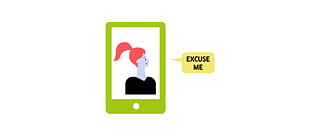“Word!” is going digital – or rather, digilectal: In the next batch of articles, our new language columnist Dirk von Gehlen will be exploring changes wrought by Internet culture in the way we write and speak. How does new slang come about? What roles do abbreviations and emojis play? How might all this help resolve some serious social issues?
TikToker Linnea Sky gifted the German language a new phrase in – and featuring – the year 2022. She didn’t even notice at first. It wasn’t until a host of other TikTokers interacted with her video that the young poster realized she’d landed a viral hit with the now legendary line: “Excuse me, wir haben 2022.” The line was originally from a clip in which she gets all worked up about the question of whether a woman has to wear a bra in this day and age.Her answer: Of course not. Because: “Excuse me, it’s 2022.”
Made in and for the moment
This retort really caught on and took on a life of its own on TikTok, and then went viral outside the platform too. It became the quip of choice to express (albeit somewhat affectedly) how “with-it” you are – and by implication how backwards someone else is. After the original clip was posted in July, this phrase kept popping up all over the place until New Year’s Eve, when it was quoted on ZDF television for the very first time… And then became obsolete overnight. So, after the stroke of midnight, Linnea Sky updated it to: “Excuse me, wir haben 2023.”Everything about the story of this little online video that went viral is rich stuff, and ample material for a whole season of Word! The Language Column. So the next few instalments will be about what’s known as “netspeak” or “digilect”, the latter-day lingo inspired by Internet culture. And Linnea Sky’s clip is a perfect place to start, and not just because we’ve just rung in the new year. It’s a so-called “meme”, i.e. a “multiparticipant creative expression through which cultural and political identities are communicated and negotiated”, as Limor Shifman defines it in Memes in Digital Culture, her book about a phenomenon often mistaken for bite-sized Internet jokes. These little memes will be writ large during this season of Word! The Language Column.
This “excuse-me” line is a particularly good lead-in because it illustrates at least four aspects I’ll be discussing in the column: First of all, it exemplifies a surprising form of language that isn’t quite English or German, and yet it’s readily comprehensible. Secondly, for its effect, this language depends heavily on intonation and imitation (i.e. active multiple-user participation). And thirdly, it comes with built-in obsolescence (and not just because of the specified year). It’s a language-on-demand, coined in and for the moment. Because – and this is the fourth key feature of netspeak and a characteristic of every language or idiom – that’s how it distinguishes insiders, i.e. those who get it, from outsiders, those who don’t.
Compatible
Let’s start with the combination of English opening and German ending. It signals cosmopolitanism, on the one hand, and linguistic limitation, on the other: after all, only a small number of those who’ve grown up in the “excuse-me” world of English speakers will get the German phrase “Wir haben 2022”. But they are not the point. The basis for the meme’s success and viral spread is its accessibility and imitability in the German-speaking cybersphere. Active internauts in this country are so familiar with English terms that the English opener makes them feel included and perhaps even encouraged to chime in. It’s important in the world of online prosumers to be able to “talk the talk”, if not “walk the walk”, yourself. The formerly passive public becomes active participants, imitating Linnea Sky’s peculiar intonation. The results are funny and timely, at least for the moment.And the built-in use-by date makes the quote a particularly good illustration of netspeak. For the distinction that comes with knowing and using the quote is always of limited duration. Nothing is more uncool than learning a meme or trend too late.
So the Word! column will be going “digilectal”, delving into all these aspects in the upcoming instalments. Though naturally – excuse me, wir haben 2023 – not without including you readers. So, which aspects of netspeak interest you and would you like to read about here? What do you not get at all? Send me your questions, requests and suggestions: sprachkolumne@goethe.de. I’ll try to work them in!
Word! The Language Column
Our column “Word!” appears every two weeks. It is dedicated to language – as a cultural and social phenomenon. How does language develop, what attitude do authors have towards “their” language, how does language shape a society? – Changing columnists – people with a professional or other connection to language – follow their personal topics for six consecutive issues.
January 2023
